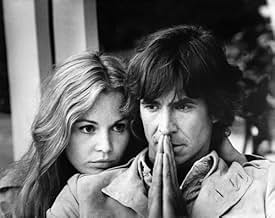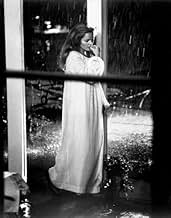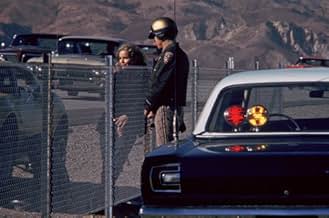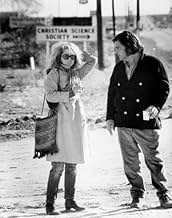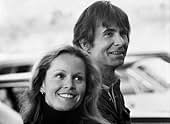A Hollywood actress undergoes a psychic breakdown and recalls the traumatic events which led to her stay at a sanitarium.A Hollywood actress undergoes a psychic breakdown and recalls the traumatic events which led to her stay at a sanitarium.A Hollywood actress undergoes a psychic breakdown and recalls the traumatic events which led to her stay at a sanitarium.
- Awards
- 1 win & 1 nomination total
Featured reviews
Jagged, pessimistic view of the denizens of Hollywood, circa 1972. Troubled movie actress, conflicted over her recent divorce from her director-husband, is finding herself slowly becoming alienated from her show business circle; unselfconscious--and still hopeful things will work themselves out--she's unable to reconnect the lost threads of her past, and begins feeling numb and catatonic. Joan Didion's novel, adapted by Didion with her husband, John Gregory Dunne, has been entrusted to director Frank Perry, and he digs right to the core of this material. It isn't just the bitchiness of the business that is wearing our heroine down, it's the blasé apathy with which the business is handled that strikes her both curious and sad. Tuesday Weld gives a deliberately low-key, thoughtful performance in the lead; her Maria Wyeth can be as tart in her repartee as her competitors (she's no shrinking violet), and yet the numbness she feels creeping in frightens her. Weld is reunited with her "Pretty Poison" co-star Anthony Perkins, excellent as a gay producer trapped in a business-marriage to a woman. The two share a quietly devastating scene in a motel room near the end that brings the narrative full circle while also showing the depth of feeling in the material (some may think the film superficial, but this is deceptive). The quicksilver editing may actually be too canny and clever, with many scenes seeming smug or half-finished (and usually ending on a rueful line or look). I think Perry means to shake the audience up with his herky-jerky structure, but perhaps the movie (with its feeling of an open wound) left too many viewers behind. A forgotten picture, it remains one of the most acidic portraits of lotus land ever captured on film. ***1/2 from ****
I was 18 when I saw Frank Perry's Play It As It Lays during its brief opening run. It affected me powerfully. Blew me out like very few films ever have, actually. Completely intoxicating. I stumbled out into the afternoon sunlight afterwards rapt and bewildered, stunned and delighted, thoroughly alive. But in the years since I've never once met a single person who's even seen it, and the whole experience has become dreamlike and lost, a memory I'm no longer sure of.
However I did pounce on Joan Didion's blistering short novel when I found it. What a fine book! No wonder the effect of the film was so profound, telling that cruel, utterly remorseless story. (And of course I fell in love, fanboy-style, with Tuesday Weld, or perhaps more truly with Maria Wyeth, the doomed and heart-breakingly aware character she inhabited.)
But rather than attempt to analyse a film that plunged me in way out of my depth when I saw it 34 years ago, I simply want to add my voice to those of earlier and more capable reviewers calling for its release on DVD. It's exactly the sort of madly brilliant one-off that cries out for Criterion treatment. Well, mutters grumpily for it anyway.
And I'd most certainly like to recommend that if you ever do get the chance to see it, make sure you do. It might have vanished, but it always was an exceptionally interesting film, one of the very great "small" ones. Perhaps the best film Robert Altman never made.
However I did pounce on Joan Didion's blistering short novel when I found it. What a fine book! No wonder the effect of the film was so profound, telling that cruel, utterly remorseless story. (And of course I fell in love, fanboy-style, with Tuesday Weld, or perhaps more truly with Maria Wyeth, the doomed and heart-breakingly aware character she inhabited.)
But rather than attempt to analyse a film that plunged me in way out of my depth when I saw it 34 years ago, I simply want to add my voice to those of earlier and more capable reviewers calling for its release on DVD. It's exactly the sort of madly brilliant one-off that cries out for Criterion treatment. Well, mutters grumpily for it anyway.
And I'd most certainly like to recommend that if you ever do get the chance to see it, make sure you do. It might have vanished, but it always was an exceptionally interesting film, one of the very great "small" ones. Perhaps the best film Robert Altman never made.
I watched this movie a lot during the first decade+ after it was released. It would show up occasionally at rep houses in NYC or SF, and I always tried to see it. The last few viewings were at the Roxie in SF, and the boom was always visible in that print; I hated that, b/c people laughed at the movie. i'm a huge didion fan (love the book), an equally huge tuesday fan. this movie captures a moment in my life, a naive moment when I tho't these chars. represented glamour and sophistication; now, having lived, I see how depressed they were. Still, it's full of great lines & has an odd nostalgic pull for me. TV versions were always tragically aborted (so to speak), and it's never been avail. to possess in any format. i shudder to think that there's no extant print, what w/studio not having one & perry gone. i've hoped to own it for so long. i was sick to hear it's on Sundance this wkend (which I don't get). why are so few people interested in seeing this movie become available? it's one of the few left on my wish-list never to be released. should any reader ever hear news of its release, please please let me know! thanks.
The movie Play It as It Lays is, admittedly, not everyone's cup of tea. Even the book--as much as I liked it--was a hard sell to friends and family; most, especially those living outside the Southern California forcefield, simply could not grasp the essential Los Angeles flavor of Didion's dry economical language. The language of the Industry is spot-on (for a change) as are the depictions of the unusual alliances and estrangements of the characters in the film. One person I know who hated the film complained that it was too "faggy" and not like the real Hollywood at all (this person lives in Tucson); the B.Z. and Maria relationship at the heart of this movie may seem bizarre and pointless to auslanders, but it certainly reminded me of real life in LA circa 1972. Also of note is Tammy Grimes' performance as B.Z.'s wife--she got so many of the good lines ("Oh God my face--I can really see a difference"; "in what?"; "skipping my Lazslo for one day.") This movie should be available in VHS/DVD; does anyone know why it's been ignored? I'd love to know.
This film, as the previous reviewers have said, is a real gem, namely for two reasons. First off, it is basically a character study of an individual who has been consumed by the lifestyle which she has adopted for herself. In the part of this tortured person, Tuesday Weld gives an exceptional performance. Her body language and facial expressions all convey the feeling of a person lost in this world that she has come to loathe. Anthony Perkins is also excellent in his role of B.Z. and he, and Weld counteract with each other beautifully.
The other main reason why this film is so intriguing, is the way it is edited and pieced together. The viewer basically goes from one scene to the next without any serious concern for continuity. Because of this fractured, choppy approach to the storytelling, some really impressive sequences are pulled off simply, yet effectively. There is one particularly impressive sequence involving Weld's character driving down a freeway, while a camera above pulls back to show the twisted, snake-like formation of the southern California freeway system. There is also the final scene, with it's haunting final message, which is certain to linger in one's mind days after seeing the film. Indeed, a very unique and special piece.
The other main reason why this film is so intriguing, is the way it is edited and pieced together. The viewer basically goes from one scene to the next without any serious concern for continuity. Because of this fractured, choppy approach to the storytelling, some really impressive sequences are pulled off simply, yet effectively. There is one particularly impressive sequence involving Weld's character driving down a freeway, while a camera above pulls back to show the twisted, snake-like formation of the southern California freeway system. There is also the final scene, with it's haunting final message, which is certain to linger in one's mind days after seeing the film. Indeed, a very unique and special piece.
Did you know
- TriviaJoan Didion wanted Sam Peckinpah to direct but he was never quite sure why she would select him, given his success as a director of Western-themed films, and declined.
- GoofsWhen Maria arrives at the "big T" to meet the abortionist's assistant the T-tops are off her Corvette. Seconds later they are on the car in the overhead shot.
- Quotes
Maria Wyeth Lang: ...existentially, I'm getting a hamburger.
- ConnectionsFeatured in Joan Didion: Le centre ne tiendra pas (2017)
- How long is Play It As It Lays?Powered by Alexa
Details
- Release date
- Country of origin
- Language
- Also known as
- Играй как по писаному
- Filming locations
- Las Vegas, Nevada, USA(Location)
- Production companies
- See more company credits at IMDbPro
Box office
- Budget
- $1,000,000 (estimated)
- Runtime
- 1h 39m(99 min)
- Aspect ratio
- 1.85 : 1
Contribute to this page
Suggest an edit or add missing content




